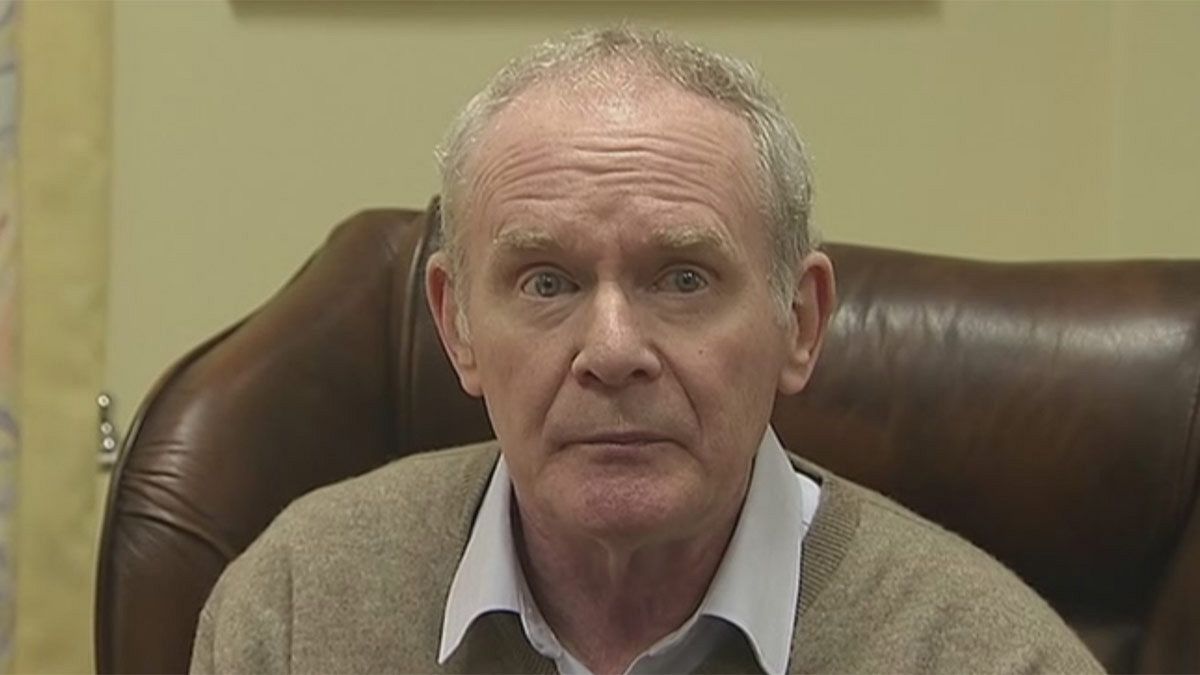Northern Ireland’s deputy first minister Martin McGuinness has resigned from office in protest over his power-sharing partner’s handling of a botched energy…
Northern Ireland’s deputy first minister Martin McGuinness has resigned from office in protest over his power-sharing partner’s handling of a botched energy scheme.
'My health has absolutely nothing to do with this whatsoever', Martin McGuinness says as he announces resignation as Deputy First Minister. pic.twitter.com/mfOpqlKXp7
— RTÉ News (@rtenews) January 9, 2017
The decision by the Sinn Féin leader all but guarantees snap elections in the province. The power sharing rules, renegotiated in 2006 after a collapse in the devolved government, mean that if either the First Minister or Deputy First Minister resigns, the ruling coalition dissolves.
M_McGuinness_SF</a> letter page 1 <a href="https://t.co/z1vlUgR0tF">pic.twitter.com/z1vlUgR0tF</a></p>— Mark Devenport (markdevenport) January 9, 2017
“Over this period of the elections, both the British government and the DUP (Democratic Unionist Party) in my opinion have grievously undermined the institutions and have eroded public confidence. So we in Sinn Féin will not tolerate the arrogance of Arlene Foster [First Minister of Northern Ireland] and the DUP,” McGuinness said.
McGuinness’ move came after the DUP’s First Minister Arlene Foster refused to step down over her role in a renewable heating scheme scandal (or “cash for ash” as it has been dubbed) that is estimated to have left Stormont with a 560 million euro hole in the public purse. Several people close to the DUP are reported to have benefitted from the scheme.
Sinn Féin has seven days to nominate McGuinness’ successor. It has already said that it will not do so as speculation about the republican leader’s ailing health has abounded since he was deemed too unwell to join a government trade mission in China last month.
Mcguinness’ resignation followed what Foster herself characterised as a “game of chicken”. Local publication The Impartial Reporter quoted Foster as saying: “If he [McGuinness] is playing a game of chicken, if Sinn Féin are playing a game of chicken and expecting me to blink in terms of stepping aside, they they are wrong. If there is an election, there is an election and we will be ready for that election as the DUP always are. For clarity, I will not be stepping aside. I will take my direction from the electorate, certainly not Sinn Féin.”
Political commentators are confused as to why Foster did not follow in her predecessor’s footsteps and stand down for up to six weeks while the heat from the scandal cooled. Peter Robinson appointed Foster in 2010 to lead in the interim as he strove to “clear his name”. It seems that Sinn Féin called Foster’s bluff in this particular game of chicken.
Newton Emerson animated: For Arlene Foster, is stepping down too much of a step back? https://t.co/6xwOGLkEg0pic.twitter.com/nxnQmiOYIY
— The Detail (@TheDetailTV) January 6, 2017
Sinn Féin’s critics argue that in forcing an assembly election, it is effectively scuppering chances of a full public inquiry into the “cash for ash” affair and allowing the DUP off the hook.
Westminster’s representative, Northern Ireland secretary, James Borkenshire said on Monday night: “The UK government has a primary role in providing political stability in Northern Ireland, and we will do all that we can to help the parties find a resolution in the coming days.
“There is a clear process set out regarding what happens next. Unless Sinn Féin nominates a replacement to the position of deputy first minister within the next seven days, it is incumbent upon me to call an assembly election within a reasonable period.
“I would urge Northern Ireland’s political leaders to take the necessary steps to work together to find a way forward and I will work with all parties and the Irish government to this end.”
A regional government dogged by scandal and political gridlock in recent years looks set for more instability while the province is still coming to terms with its future post-Brexit.
